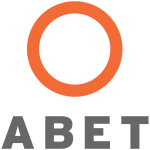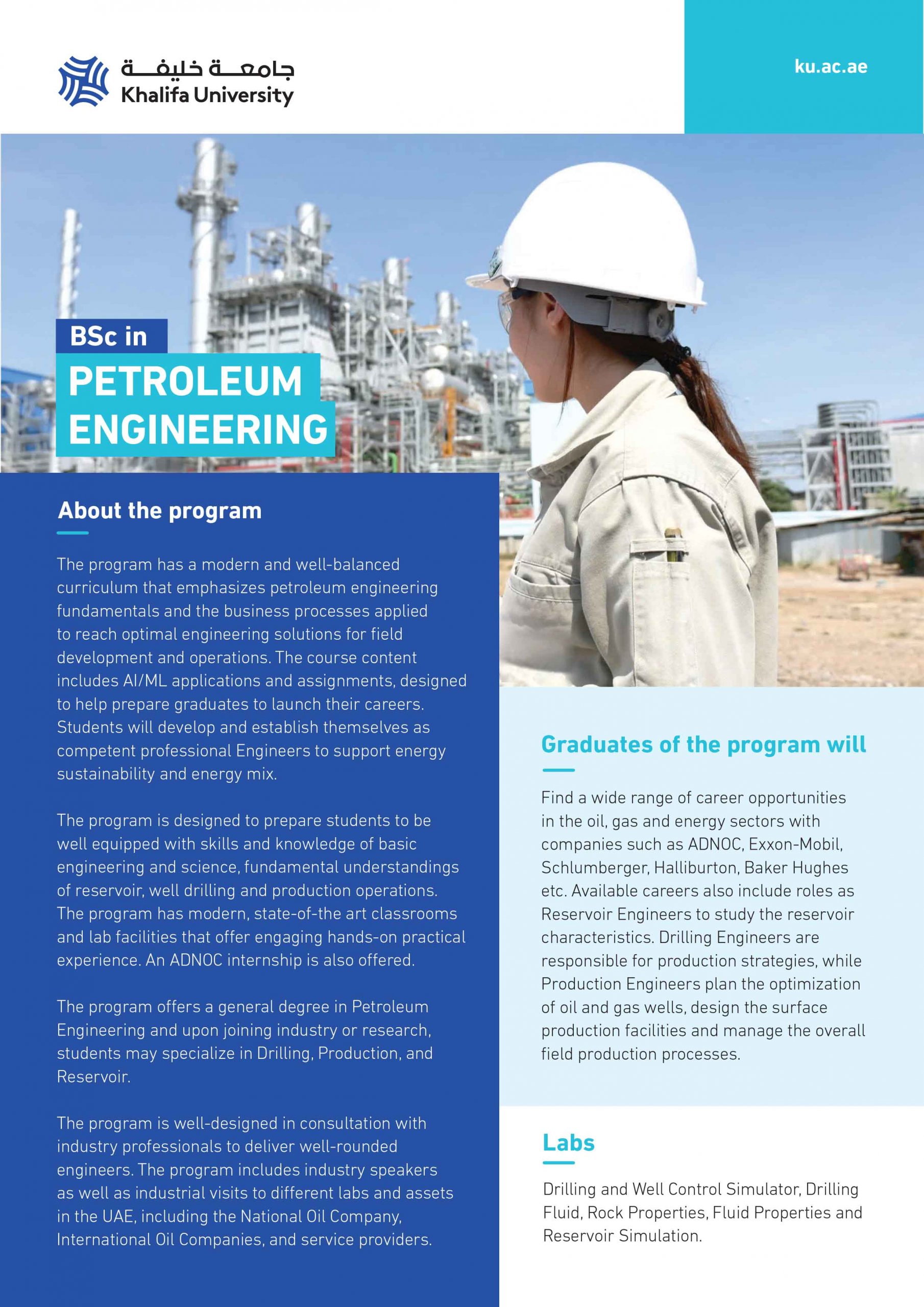Course Description of Petroleum Engineering
PEEG 218 Reservoir Rock Properties (2-3-3)
Prerequisite: ENGR 111
Theoretical introduction to basic rock properties and their core-based measurements determined by conventional and special core analysis. It will be discussed how to obtain reliable core analysis data and the specific topics include porosity, permeability, Darcy’s law with applications/limitations, saturations, wettability, capillary pressure, relative permeability, resistivity, compressibility and the effect of stresses on rock mechanical properties. Laboratory experiments will reinforce concepts discussed in the classroom.
PEEG 219 Reservoir Fluid Properties (2-3-3)
Prerequisite: PEEG240 (or MEEN 240), CHEM 116
The theoretical and laboratory parts of this course cover the basic characterization of reservoir fluids, their properties, their determination and their measurement. Topics covered include phase behaviour, density, saturation pressures, gas-oil ratios, shrinkage, oil and gas formation factors, viscosity and the compositional analysis of oil, gas, and brine.
PEEG 252 Statics and Mechanics of Materials for PE (3-0-3)
Prerequisite: MATH 112; PHYS 121
A combined course of Statics and Strength of Materials for petroleum engineering. Forces, force couples, resultants, free body diagrams, equations of equilibrium and internal/external forces are first covered in statics and then applied to problems of stress analysis and deformations in deformable bodies under axial, torsional, bending and combined loading in the mechanics of materials part. Stress tensor is introduced and the significance of elastic parameters is highlighted. Stress transformation equations, experimental methods of measuring rock strength, and failure criteria are also discussed.
PEEG 302 Fluid Mechanics and Heat Transfer (3-0-3)
Prerequisite: PEEG 240 or MEEN 240
This course introduces the principles of momentum transfer and overall mass, energy and momentum balances including an introduction to multiphase flow in pipes. Topics also include the principles of steady-state and unsteady-state heat transfer. Specific applications such as measurement of fluid flow, pumps, gas-moving equipment, prediction of pressure drop in pipes, restrictions and manifold systems, heat exchangers, and thermal gradient and heat transfer in oil and gas wells are stressed.
PEEG 314 Well Logging (3-0-3)
Prerequisite: PEEG 218, PHYS 122
Co-requisite: PEEG 322
This course provides an introduction to the various well logging methods, tools and their principles of operation with emphasis on the relationship between measurements and reservoir petrophysical properties. Conditions and limitations for applications of various logs are discussed. Graphical and analytical methods used to determine formation composition, contents, and its potential for production are developed and applied to create graphs and log traces, and determine reservoir parameters.
PEEG 315 Reservoir Characterization (2-3-3)
Prerequisites: PEEG 219, PEEG 314, PGEG 311
Students learn how to integrate geological, geophysical, petrophysical and engineering data, using geostatistical tools and workflows, to characterize the reservoir and build a 3D static model, to be used in subsequent reservoir simulation studies. They will also learn how to use Petrel software to load, process, interpret and visualize the reservoir in three-dimensions and carry out uncertainty analysis on volumetrics using Monte Carlo simulation.
PEEG 322 Drilling Engineering I (2-3-3)
Prerequisite: PEEG 252
Co-requisite: PEEG 314
This is an introductory level drilling course which introduces rotary drilling process and basic drilling rig components to the students who have no prior knowledge on oil well drilling technology. Hands on laboratory testing of drilling fluids will be covered. At the end of the course the students should be able to assess formation pressures and fracture strengths; design mud programs and casing shoe depths; design basic components of a drilling rig to meet a given and be familiar with popular drilling problems.
PEEG 326 Drilling Engineering II (2-3-3)
Prerequisites: PEEG 302; PEEG 322
This is an advanced level drilling course designed for students who have prior knowledge of drilling fundamentals. The course covers a range of topics from casing and cementing technology, hydraulics, directional drilling, and well control. Upon completing this course, the students should be able to select casing grades for a given well data, formulate, design and analyze cementing operations as well as directional drilling data analysis. Hands on practical sessions on drilling simulators will be covered.
PEEG 331 Reservoir Engineering I (3-0-3)
Prerequisite: PEEG 218; PEEG 219; PEEG 302
This course presents the students with material balance, the derivation and application of zero-dimension reservoir models for practical reservoir management and performance prediction. The subject of oil or gas initial and remaining reserve will be covered, in relation with initial hydrocarbon in place through the concept of unit recovery, recovery efficiency and recovery factor. The course will also present the different types of hydrocarbon reservoirs, with their possible oil and gas drive mechanisms.
PEEG 336 Well Testing (3-0-3)
Prerequisites: PEEG 331, PEEG 314, MATH 206
This course covers theoretical development of flow equations governing well testing in oil and gas wells. Line source analytical solutions of flow equations will be covered concentrating on semi-log analysis and type-curve matching. The principle of superposition will also be discussed. Production capacity of a well and pressure derivative analysis will be introduced.
PEEG 341 Completion and Workover (3-0-3)
Prerequisite: PEEG 322
The course presents different well completions and workover techniques in a comprehensive method. The well completions for varying field conditions are discussed, including technical and economic considerations. Downhole components and design of tubing string for most types of well are discussed. The methods of opening the formation with the wellbore for production are detailed with types of perforation techniques. Workover procedures including remedial cementing, well stimulation methods are taught with required design procedures.
PEEG 360 Petroleum Economics & Risk Analysis (4-0-4)
Prerequisite: HUMA 150
The objective is to develop students’ expertise in the area of economics and risk/uncertainty analysis and their relation to decision making processes in the petroleum industry. It introduces students to the concept of business economics implemented in the modern petroleum industry. This approach improves students’ skills in utilizing all available information about the project and related economic influences in depicting a realistic projection of the project worth and the chances of business success.
PEEG 391 Independent Study I (From 1 to 3)
Prerequisite: Junior standing and approval of the department
This course gives an upper level undergraduate student the opportunity to participate in an individual or group project, study, or research activity under the supervision of a faculty member. A formal report is required.
PEEG 394 Research Topics in Petroleum Engineering (rom 1-3 credits)
Prerequisite: Junior standing and approval of the department
The course focuses on research-driven topics. A student can take multiple Research Topics courses with different content for credit subject to program approval.
PEEG 395 Special Topics in Petroleum Engineering (from 1-3 credits)
Prerequisites: Junior standing and Topic Specific
This course mainly deals with new trends in petroleum engineering and emerging technologies. Course is repeatable if title and content differ.
PEEG 420 Well Treatment (3-0-3)
Prerequisites: PEEG 341; Senior standing
This course discusses the causes of production impairment and methods of improving well productivity using established well treatment methodologies. Two important area of a production system will be covered, the near wellbore formation (formation damage issues) and the production system (wellbore to separator, flow assurance issues). Topics include loss of productivity due to formation damage, asphaltene, wax and inorganic solid deposition along with detail mitigation methods. The course will also cover chemical based treatment methods to control/shut-off excessive water and gas production and injection water profile control. A significant part of the course will focus on diagnosis of problem, selection and application of chemicals, tools and hardware and designing specific well treatment operations.
PEEG 423 Horizontal and Multilateral Well Technology (3-0-3)
Prerequisite: PEEG 326
This is a comprehensive course designed to familiarize petroleum-engineering students with the benefits and design of horizontal and multilateral wells. The topics covered include key details of drilling and completion of horizontal and multilateral wells, such as planning, drilling, surveying, tubular selection, failure analysis, cutting transport, hole-stability, cementing, centralizer spacing, etc. Students work on design examples and utilize an industry software package.
PEEG 424 Underbalanced Drilling Technology (3-0-3)
Prerequisite: PEEG 326
This course is designed to familiarize students with the five popular UBD techniques. These are Air/Natural Gas Drilling, Mist Drilling, Foam Drilling, Gasified Liquid Drilling and Flow Drilling. Benefits and limitations of each technique along with the design principles and operational procedures are discussed. Common problems pertinent to each technique and recommended procedures are also discussed.
PEEG 425 Pressure Control (3-0-3)
Prerequisite: PEEG 326
This course is designed to introduce fundamental well control principles, procedures and control equipment to the students who have completed their basic drilling engineering courses. Students will learn concepts of formation pressure, static and dynamic well bore pressures; primary and secondary well control, shut in procedures; kick circulation procedures; well control equipment and alleviate kick circulation problems. Students will also have hands on training and an IWCF-type practical exam on the PI Drilling Simulators.
PEEG 434 Reservoir Engineering II (4-0-4)
Prerequisite: PEEG 315; PEEG 331; MATH 206
Key reservoir parameters required to calculate recovery factor, mobilization, sweep efficiencies, fractional flow analysis, and heterogeneity interaction and their influence on recovery factor are fully covered. General principles relating to SCAL properties and volumetric sweep that should be considered in planning secondary recovery, EOR and IOR processes are reviewed. Introduction to reservoir simulation principles is also discussed.
PEEG 437 Natural Gas Engineering (3-0-3)
Prerequisite: PEEG 331
This course covers gas reservoirs rock and fluid Properties, including Darcy and non-Darcy flow phenomena near gas wells. Gas reserves estimation using linearized MBE and Decline Curve Analysis will be evaluated. Decline curves analysis of Arps and Fetkovich will be studied. Gas flow and gas well testing to evaluate reservoir characteristics will be covered, considering the pressure solution, p2 solution, real gas pseudo pressure solution of the gas transient flow equation. Deliverability of gas wells will be determined using multi-rate draw down testing, flow after flow testing, isochronal testing, and modified isochronal testing. Prediction of future performance and ultimate recovery form gas reservoirs will be studied.
PEEG 442 Surface Production Facilities (3-0-3)
Prerequisite: PEEG 302
This course covers the description, applications, design, analysis, and operational issues of surface production facilities. Topics include Wellhead choke, 2-phase, and 3-phase separation, emulsion treatment, desalting, oil stabilization, water treatment, gas dehydration and sweetening, and storage. Principles governing the flow of oil, gas, and water in the surface production system will be covered. Surface production problems (corrosion and environmental) and safety issues are also included.
PEEG 445 Production Enhancement (3-0-3)
Prerequisites: PEEG 341, PEEG 443
This course discusses the causes of production impairment and methods of improving well productivity. Topics include loss of productivity due to formation damage, solids deposition, excessive water and gas production, and bottlenecks in the production system; and production enhancement by matrix treatments, remedial cementing and production profile control. De-bottlenecking of the production system through Nodal analysis of the production system is also covered.
PEEG 447 Production Engineering (3-0-3)
Prerequisites: PEEG 331, PEEG 341
This course utilizes the Total System Analysis technique for the design and performance analysis of the production system starting from the reservoir through the wellbore to the production separator. Topics include inflow performance relationships (IPR), vertical lift performance (VLP) for multiphase flow in vertical and inclined pipes, overall well performance evaluation considering various nodes within the production system. Artificial lift techniques of gas lift and electrical submersible pumps (ESP) are also taught. The course also includes surface production facilities for handling and separation of oil, gas, and water.
PEEG 456 Petroleum Related Rock Mechanics (3-0-3)
Prerequisites: PEEG 252
Rock mechanics principles and topics such as nature of rock, rock deformability and rock stress, engineering properties of rocks from laboratory testing, and the effect of factors such as pore pressure, temperature and time on rock behavior are covered. Rock strength and failure and mathematical approaches to stress-strain analysis in rocks will be discussed together with applications such as borehole stability analysis and reservoir compaction.
PEEG 491 Independent Study I (From 1 to 3)
Prerequisite: Approval of department and senior standing
This course gives an upper level undergraduate student the opportunity to participate in an individual or group project, study, or research activity under the supervision of a faculty member. A formal report is required.
PEEG 494 Research Topics in Petroleum Engineering (From 1-3)
Prerequisite: Senior standing and approval of the department
The course focuses on research-driven topics. A student can take multiple Research Topics courses with different content for credit subject to program approval.
PEEG 495 Special Topics in Petroleum Engineering (from 1-3 credits)
Prerequisites: Senior standing and Topic Specific
This course mainly deals with new trends in petroleum engineering and emerging technologies. Course is repeatable if title and content differ.
PEEG 497 Senior Design Project I (3-0-3)
Prerequisites: PEEG 322, PEEG 315, PEEG 336, PEEG 360
Co-requisites: PEEG 434, PEEG 447
This is the first course in a sequence of two courses; Design Project I (DP I) and Design Project II (DP II). DP I covers up to Drilling & Completion design and the rest is covered in DP II (PEEG 498). This is a team-based design project pertaining to field development plan of a hydrocarbon reservoir, incorporating realistic design constraints, and engineering ethics. The steps involve reservoir description and volumetric evaluations, development planning, drilling and completion design, estimation of fluid production rates, surface facility design, and economic analysis. A reservoir management and surveillance strategy for long term production sustenance is also included.
PEEG 498 Senior Design Project II (3-0-3)
Prerequisites: PEEG 497
Petroleum Engineering Design Project II (PEEG 498) is a continuation of PEEG-497. After completing the first 3 modules, i.e. reservoir description and volumetric evaluations, development planning, drilling and completion design, students are required to complete the remaining three modules, namely, reservoir development and management strategies, designing an oil, gas and water separation and processing facilities and finally perform a comprehensive economic analysis of the project, with due consideration of the realistic engineering constraints, as well as the issues relating to safety and ethics in oilfield operations.




